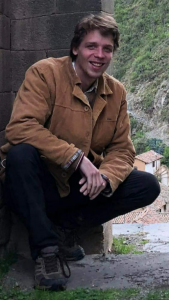
Abstract
The Túpac Amaru Revolution (1780-83), stretching from northern Argentina up to northern Peru was the largest indigenous challenge to colonialism in the Americas before the Spanish-American wars of independence. Drawing on the work of Michel-Rolph Trouillot, Sibylle Fischer and Sinclair Thomson, I argue the Túpac Amaru Revolution, as the Haitian Revolution before it, continues to suffer from a process of silencing and trivialization in western historiography.
This presentation will center around a micro-historical case study of inter-ethnic revolutionary cross-dressing in Tapacarí (modern-day Bolivia) in 1781. The Tapacarí uprising has been characterized as an “archetypical” event illustrating the revolution’s rapid escalation into an anti-white, anti-European “subaltern genocide” where “nothing catholic was sacred”. (Robins, 2005)
My own analysis draws on decolonial theory, ethnography, historical anthropology and art history. It is a result of my own cross-archival work in the archives of La Paz, Sucre and Cochabamba in Bolivia.
I re-evaluate the events in Tapacarí as a process of “border thinking” where indigenous revolutionaries made use of both Spanish colonial concepts, categories and knowledges as well as otherwise silenced indigenous concepts, categories and knowledges in order to dismantle the colonial racialized hierarchy.
I reflect on how the framework of “subaltern genocide”, beyond its historical inaccuracy, reinforces cultural essentialist stereotypes. I discuss it’s relation to the traditional paradigm of “race war” and how it reinforces the process of silencing and trivialization regarding the Túpac Amaru Revolution.
Finally, I offer some reflections on the relevance of my decolonial perspective for broader historiographical and academic debates surrounding indigenous and non-European anti-colonial resistance, the Age of Revolutions, Eurocentrism and debates around indigeneity, modernity and “hybridity” in general.
Bionote
I am a postgraduate student at the Centre of Latin-American Research and Documentation (CEDLA) at the University of Amsterdam where I am enrolled in a post-initial Master’s degree in Latin American Studies. Previously, I obtained a bachelor and Master degree in History at the University of Ghent. In March-April 2023 I conducted archival research and field work in La Paz, Cochabamba and Sucre (Bolivia). Prior to that I spent a year living and travelling in Peru and Bolivia (2021-2022). I also have a minor in Political and Social Sciences and completed the preparatory program for a Master of Science in Conflict and Development Studies.
Practical information
When?
October 16 — 12u30
Where?
- Join us offline: Malpertuis, UFO, Campus Ufo (Sint-Pietersnieuwstraat 33, 9000 Gent — third floor)
If you wish to join us offline, please send us an e-mail at tapas@Ugent.be so that we can reserve you a seat.
- Join us online: Video call link